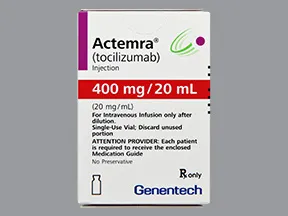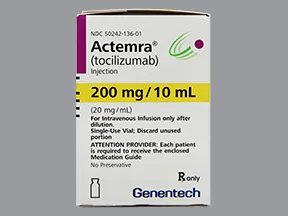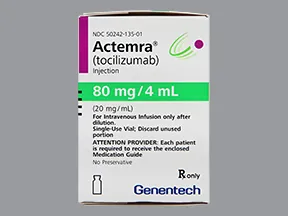Lab and/or medical tests (such as complete blood counts, liver function, cholesterol tests) should be done before you start using this medication and while you are using it. Keep all medical and lab appointments. Consult your doctor for more details.
This medication may lower your ability to fight an infection. This may make you more likely to get a serious (rarely fatal) infection or make any infection you have worse. Your risk may be increased if you are also taking other drugs that can lower your ability to fight an infection (such as methotrexate or corticosteroids). Before using tocilizumab, tell your doctor your medical history, especially of any kind of infection. During treatment, tell your doctor right away if you develop any signs of infection (such as cough, sore throat, fever, chills, pain when urinating).
Before starting this medication, your doctor should test you for tuberculosis (TB), except if you are using this medication to treat COVID-19. Your doctor should monitor you for symptoms of TB during treatment with this drug. If needed, treatment for tuberculosis or other infections should be given before receiving this medication.
How to use Actemra Vial
Read the Medication Guide provided by your pharmacist before you start using tocilizumab and each time you get a refill. If you have any questions, ask your doctor or pharmacist.
This medication is given by a health care professional as directed by your doctor. It is given by slow injection into a vein for 60 minutes. For the treatment of rheumatoid arthritis in adults, PJIA, or giant cell arteritis, this medication is usually given every 4 weeks. For the treatment of SJIA, this medication is usually given every 2 weeks. For the treatment of CRS or COVID-19, this medication is given once and then as directed by your doctor if more doses are needed.
The dosage is based on your medical condition, age, weight, lab tests, and response to treatment.
Use this medication regularly to get the most benefit from it. To help you remember, mark the days on a calendar when you need to receive the medication.
Tell your doctor if your condition does not improve or if it worsens.
Side Effects
See also Warning section.
Headache or pain/redness/swelling at the injection site may occur. If any of these effects last or get worse, tell your doctor or pharmacist promptly.
Remember that this medication has been prescribed because your doctor has judged that the benefit to you is greater than the risk of side effects. Many people using this medication do not have serious side effects.
Tell your doctor right away if you have any serious side effects, including: stomach/abdominal pain.
Tocilizumab has rarely caused very serious (possibly fatal) liver disease. This effect may occur months to years after starting this medication. Tell your doctor right away if you develop symptoms of liver disease, such as nausea/vomiting that doesn't stop, loss of appetite, yellowing eyes/skin, dark urine.
A very serious allergic reaction to this drug is rare. However, get medical help right away if you notice any symptoms of a serious allergic reaction, including: rash, itching/swelling (especially of the face/tongue/throat), severe dizziness, trouble breathing.
This is not a complete list of possible side effects. If you notice other effects not listed above, contact your doctor or pharmacist.
In the US - Call your doctor for medical advice about side effects. You may report side effects to FDA at 1-800-FDA-1088 or at www.fda.gov/medwatch.
In Canada - Call your doctor for medical advice about side effects. You may report side effects to Health Canada at 1-866-234-2345.
Precautions
Before receiving tocilizumab, tell your doctor or pharmacist if you are allergic to it; or to any tocilizumab products; or if you have any other allergies. This product may contain inactive ingredients, which can cause allergic reactions or other problems. Talk to your pharmacist for more details.
Before using this medication, tell your doctor or pharmacist your medical history, especially of: diabetes, immune system problems, infections (including past/current/returning), liver problems, low blood cell count, nervous system problems (such as multiple sclerosis), stomach/abdominal problems (such as ulcers, diverticulitis).
Tocilizumab can make you more likely to get infections or may make current infections worse. Stay away from anyone who has an infection that may easily spread (such as chickenpox, COVID-19, measles, tuberculosis, flu). Tell your doctor if you live in, have lived in, or have traveled to certain areas where there is an increased chance of getting certain kinds of fungal infections (blastomycosis, coccidioidomycosis, histoplasmosis). Talk to your doctor if you have been exposed to an infection or for more details.
Tell your health care professional that you are using tocilizumab before having any immunizations/vaccinations. Avoid contact with people who have recently received live vaccines (such as flu vaccine inhaled through the nose).
Drugs that affect the immune system (such as tocilizumab) may increase your risk of certain cancers. Tell your doctor if you have ever had any type of cancer.
Before having surgery, tell your doctor or dentist about all the products you use (including prescription drugs, nonprescription drugs, and herbal products).
During pregnancy, this medication should be used only when clearly needed. Discuss the risks and benefits with your doctor.
It is unknown if this drug passes into breast milk and the effect on a nursing infant is unknown. Consult your doctor before breastfeeding.
Interactions
Drug interactions may change how your medications work or increase your risk for serious side effects. This document does not contain all possible drug interactions. Keep a list of all the products you use (including prescription/nonprescription drugs and herbal products) and share it with your doctor and pharmacist. Do not start, stop, or change the dosage of any medicines without your doctor's approval.
Some products that may interact with this drug include: other drugs that can affect the immune system (such as certolizumab).
This medication can speed up the removal of other medications from your body, which may affect how they work. Examples of affected drugs include some cholesterol drugs such as atorvastatin/lovastatin/simvastatin, omeprazole, warfarin, among others.
This medication may decrease the effectiveness of hormonal birth control such as pills, patch, or ring. This could cause pregnancy. Discuss with your doctor or pharmacist if you should use reliable backup birth control methods while using this medication. Also tell your doctor if you have any new spotting or breakthrough bleeding, because these may be signs that your birth control is not working well.
Overdose
If someone has overdosed and has serious symptoms such as passing out or trouble breathing, call 911. Otherwise, call a poison control center right away. US residents can call 1-800-222-1222. Canada residents can call 1-844-764-7669.
It is important to get each dose of this medication as scheduled. If you miss a dose, ask your doctor or pharmacist right away for a new dosing schedule.
Not applicable. This medication is given in a clinic and will not be stored at home.
Images

Actemra 400 mg/20 mL (20 mg/mL) intravenous solution
Color: colorlessShape: Imprint:This medicine is a colorless, clear, vial

Actemra 200 mg/10 mL (20 mg/mL) intravenous solution
Color: colorlessShape: Imprint:This medicine is a colorless, clear, vial

Actemra 80 mg/4 mL (20 mg/mL) intravenous solution
Color: colorlessShape: Imprint:This medicine is a colorless, clear, vial